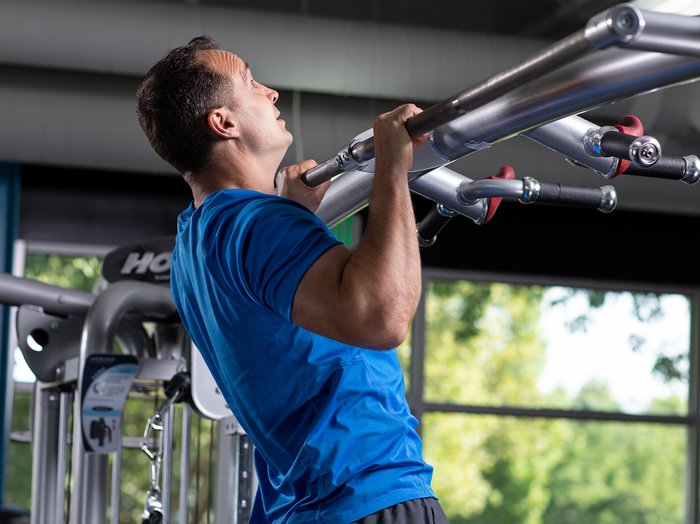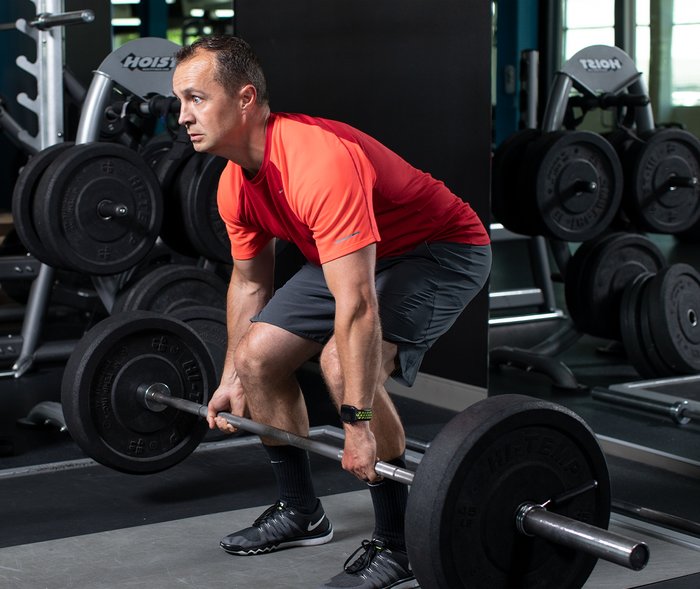Charles Staley
November 01, 2018
•
3 min read
Q: Are there any useful or game-changing strength standards for over-40 men and women?
This is such a useful question that I’m going to tackle it, although my answer may leave some of my readers dissatisfied. But let’s take a stab at it.
My first thought is that we should ask ourselves why we’re seeking such standards in the first place. My take: We love standards because it gives us something to shoot for, and also because it’s a way for us to rank ourselves with respect to our peers. If you can do one pull-up and your friend can’t do any, well, that says something about where you “stand,” right?

The problem however, is that there are a lot of characteristics that must be considered when we’re trying to assess who our “peers” are. Age and sex are two of the most obvious, but we also need to consider height and weight. Digging deeper, there’s orthopedic history, training background, fiber-type dominance, and general health, just to name a few of the more relevant considerations.
Suddenly, picking an objective standard out of the mix is a pretty big challenge. So, let’s dig deeper into what is really a philosophical question, but one that I want to address honestly and usefully.
The Big Draw of Big Lifts
Let’s take a very commonly used standard and evaluate it for the sake of discussion.
Many coaches will state that you’re “strong” if you can deadlift two times your body weight. Superficially, I tend to agree. If you take the entire human population, certainly less than 1 percent could pull double their body weight for a single rep (although almost all of those who can will probably be young men). So from this general standpoint, I like the standard.
Now, if you’re over 40 and can pull double your body weight, it’s even more meaningful, of course. Over 50, even better. Personally, at age 59, I can pull double body weight for 10 reps, so that seems super strong, I guess. But my other lifts, such as the bench press, are far less impressive. I just happen to be a good deadlifter, for whatever reason.
I think you can already start to appreciate the complexity of this question. For this reason, I tend to think of strength standards in a pragmatic and personal way, rather than worrying too much about how “valid” the standard is or isn’t. In my case, I sometimes look at the powerlifting lifter classifications just to see how I stack up relative to raw competitive powerlifters who are my sex and body weight. Of course, I’m much older than open-class lifters, so I take this into account, but I use this as a way to motivate myself. And if it serves that purpose, then those standards have utility for me.

If, on the other hand, you don’t have much experience doing the three powerlifts, or if you simply focus your strength training elsewhere, these standards would not be relevant or useful for you. The question is, what would be?
If You’re Getting Stronger, You’re Strong
Here’s a standard that I think has the most utility for over-40 lifters: The vast majority of people age 40 and up are physically declining. This means that if you’re currently getting stronger—even if only very gradually—you’re “strong.” Honestly, even if you’re just maintaining, you’re way ahead of your peers.
I often remark to my clients that no matter how strong you are, you’ll always find people who are stronger. For example, I’m proud that I can deadlift 405 pounds for 10 reps, but the other day I watched a video of Larry Wheels pulling an unreal set of 700 for 10. Sure, he is much younger and bigger than me, but still—700 for 10?!
All of this simply means that you are best served by mostly evaluating yourself against your current abilities. We are either improving, maintaining, or declining.
If tomorrow you get a new lifetime personal record on pull-ups, you’re stronger than you ever were. Even if that PR is just one rep! And if you’re over 40, that makes your accomplishment even more meaningful. For me, this is the only meaningful standard.
Is Strength Really Your Biggest Weakness?
I’ll leave you with one final consideration: Yes, it’s super valuable to be strong, but insufficient strength may not be your Achilles heel in terms of overall physical capacity. You might be super strong, but have poor cardiovascular capacity or mobility. Many of your health markers may be bad, even if your PRs are respectable.
If this is the case, your health, longevity, and overall quality of life will be better served by first addressing whatever your greatest physical deficiency happens to be. That, in turn, will not only help you get strong, it will help you feel strong.
from Weight Loss Insider https://ift.tt/2QCxeoq
via Best Weight Loss Supplement

0 comments:
Post a Comment